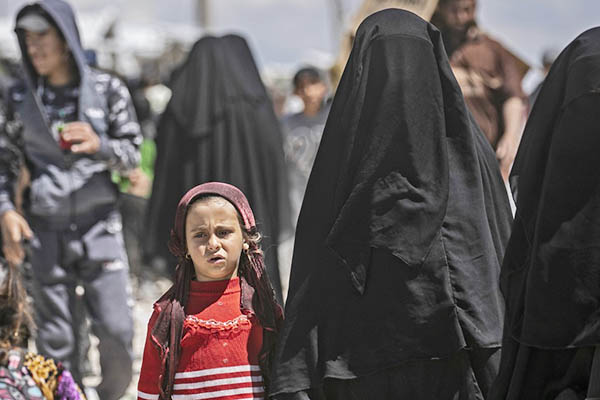
Delil Souleiman—AFP
Senior official of global body says thousands of children of Islamic State fighters must be repatriated, reintegrated to origin states
A senior U.N. official called on Thursday for countries to take responsibility for their nationals stuck in a camp in Syria, including thousands of foreign children of Islamic State group fighters.
“There is a prime responsibility of states vis-a-vis their own nationals,” Panos Moumtzis, the U.N. regional coordinator for Syria, told reporters in Geneva.
According to the U.N. children’s agency UNICEF, around 3,000 foreign children from 43 countries are housed at the Al-Hol camp in northeastern Syria alone, which has taken in most of the people fleeing I.S.’s self-proclaimed “caliphate.”
The Kurdish-run camp has seen its population explode from around 10,000 people last December to more than 75,000 people now, Moumtzis said.
According to other estimates, the camp could hold up to 100,000 people, more than 90 percent of whom are women and children. The huge influx followed the assault by U.S.-backed forces against the last I.S. holdout, which collapsed last month.
Conditions at the camp and along the route have been dire.
According to the U.N., 260 people have died while making the journey or upon arrival at the camp since December, including 211 children under the age of five.
Foreign women and children with ties to I.S. foreign fighters are being held in a separate area of the camp.
Several governments have been grappling with the problem of what to do with captured jihadist fighters from their country, the women who married them and their children. “All member states have to do all measures possible to make sure the protection, the prosecution, the repatriation the rehabilitation and the reintegration of these women and children in compliance with their obligations under international law,” Moumtzis said.
He insisted that countries should provide children of their nationals citizenship, and all the rights that go along with it. “The right to nationality is really very important under the Universal Declaration of Human Rights,” he said, stressing that “really nobody should be rendered stateless.”
“These children do have a father and a mother, [who] have a nationality, and therefore a solution has to be found,” he said.
Moumtzis also appealed to countries to quickly release desperately-needed funds to help people facing dire conditions in the camp and elsewhere in conflict-torn Syria. He hailed that international donors last month in Brussels pledged nearly $7 billion in aid for 2019 for civilians caught up in Syria’s bloody civil war.
But he warned that not much of the cash had materialized yet, and urged countries not to wait to honor their contribution. “The money in the bank is very low at the moment,” he said.
